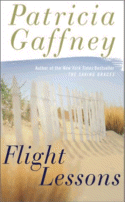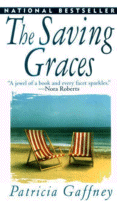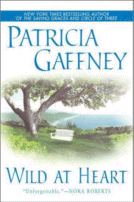Patricia Gaffney was born in Tampa, Florida, the younger of the
two children of Joem and Jim Gaffney. With her brother Mike, she
grew up in Bethesda, Maryland, a suburb of Washington, D.C., and
graduated from Walter Johnson High School. She earned a bachelor's
degree in English and philosophy from Marymount College in
Tarrytown, New York, and also studied literature at Royal
Holloway College of the University of London, at George Washington
University, and at the University of North Carolina at Chapel Hill.
After college, Gaffney taught 12th grade English at East
Mecklenburg High School in Charlotte, North Carolina, "for one
excruciating year. The kids were great, but they were bigger
than me and I was scared of them." Returning to Chapel Hill,
instead of finishing her master's degree in education, she
took a job as a freelance court reporter, and pursued that
career in North Carolina, Pittsburgh, and Washington, D.C., for
the next fifteen years.
In January of 1984, Gaffney discovered a malignant lump in her
breast. "I was positive I was dying; I gave myself five years.
Time to decide, and fast, what to do with the rest of my too-short
life." In the end, the decision was easy because it was what
she'd always wanted to do: write books and live in the country.
In 1986, she and her husband left Washington and moved to rural
southern Pennsylvania, where they live today.
There Gaffney began the first of what would be twelve published
historical romance novels. The first, Sweet Treason,
appeared in 1989 and won the Romance Writers of America's Golden
Heart as well as other first-book awards. Six of her novels have
been nominated for RWA Rita awards, and Wild at Heart (1997)
was among ten finalists for the reader-nominated Favorite Book of
the Year Award.
After a dozen books, Gaffney says she began to feel restless.
"I'd run out of stories I wanted to tell in the context of
historical romance. And I had an urge to put more of myself in
my novels. I'll always tell stories, but now I wanted to change
the truth/fantasy ratio, weight it more toward my real life."
In June of 1999, HarperCollins published The Saving
Graces, Gaffney's hardcover fiction debut. "Real life"
definitely played a part in this story of four women friends,
one of whom battles a cancer recurrence. "I've belonged to the
same women's group for almost 20 years. Eight years ago, we
lost one of our members to breast cancer. The Saving Graces
tells her story, not mine." More than that, it explores issues
of love, friendship, trust, and commitment among women.
Gaffney says she hopes it speaks to the universal experience
of women blessed with the gift of close friendships.
Circle of Three was Gaffney's second hardcover novel,
published by HarperCollins in June of 2000. The protagonist is
a member of the "sandwich generation," a woman who both has a
mother and a daughter and is a mother and a daughter. Gaffney
explores the reality of women's lives in the context of three
generations, grandmother, mother, and daughter.
In July of 2002, HarperCollins published Flight Lessons.
Set in a small town on Maryland's Eastern Shore, Flight
Lessons is the story of 30-something Anna Catalano who
comes home, after a long self-exile, to help run the Bella
Sorella, the family Italian restaurant. Once again the focus
is family, both Anna's real one as well as the Bella Sorella's
steamy, chaotic, metaphorical family. Sins are committed and
forgiven, hearts broken and healed. Gaffney explores favorite
themes in this book about food, family, and forgiveness.
Patricia Gaffney is currently at work on her fourth novel for
HarperCollins.
You write a lot about female relationships -- friends; mother and daughters; and now, in Flight Lessons, aunt and niece. Why have you chosen the bond between women as an ongoing theme?
I think it's possible women are more interesting than men, at least in certain ways that apply to fiction. We don't have parity yet, nowhere near 50% of the power, and it's always more interesting to write about the underdog. Physically, biologically we're more vulnerable, so we never feel quite safe -- that makes us more observant, which makes us more accessible as characters. We're more fully involved in relationships than men are. We find out who we are in terms of our relationships with other people, and that makes us more real on the page. We're less linear, more intuitive. Our emotions don't embarrass us, and fiction is all about emotion. I like our conversations and our leaps of faith, our psychologies and vulnerabilities. We're just
interesting.
How do you get inspired to write your characters? In The Saving Graces you had four very different women, and in Flight Lessons, again, two very different women who are related.
One way I find out who my characters are is by naming them. Believe it or not, Anna's name was originally Holly. Holly Catalano. Wrong, wrong, wrong, but I didn't know that until about page 130. And she had a sister named Violet, who I disposed of in the second draft. When I changed her name to Anna Catalano -- to me that's a very evocative name -- I could picture her: tall and angular, dark-haired and dark-eyed, nobody's fool, but ruled more by her heart than her head. Not beautiful now, maybe, but she will be when she's old. "Rose Fiore" (the aunt) is a resonant name, too, but in a subtler way. Rose is older, wiser. She's got Anna's dark eyes but they're not as sharp. They've gone gentle with sadness.
Anna and Rose are niece and aunt, but I think at the core,
Flight Lessons is a mother-daughter story. That's what these women are to each other, really, that's how close they are. It's why Anna overreacts to Rose's so-called betrayal, why she runs away and stays away for 15 years. Catching your father in bed with your aunt, especially after your mother's been dead for seven years -- that's not grounds for running away unless your connection is really deep, as deep as the mother-daughter bond.
So I wanted to explore how two women who love each other dearly might find their way back to each other after one commits an apparently unforgivable act. I'm fascinated by the theme of forgiveness. Families bring out the worst and the best in us. We do awful things to the ones we love most -- I don't know why; I guess because we can. In
Flight Lessons, Anna has to learn to forgive Rose for an ancient betrayal; Rose has to learn to forgive Anna for being self-righteous, intolerant, and pretty much a blockhead. That's the autobiographical part of this novel -- I've been a giant blockhead any number of times with the people I love most dearly, and I've been on the receiving end of a great deal of blockheadedness from them. All we can do is try to keep our hearts open. Pride is fun to write about, but it's a terrible sin in real life because it stifles compassion. Every book I've ever written has ultimately been about forgiveness.
What's different for you in creating male characters? In Flight Lessons, one of your major characters is the elusive Mason Winograd. How did his character come about?
Even though my recent books have focused on the lives of women, there's always been a significant love affair going on somewhere with every principal woman character in the story. Mason evolved slowly. I didn't realize until about halfway through the second draft that he was recovering from agoraphobia. Originally he was much healthier -- he even had a wife! They were separated, and she kept appearing at inconvenient moments, trying to reconcile. Eventually I did away with her -- she didn't really serve any purpose except to cause trouble. (Although, come to think of it, that's a pretty good purpose.)
I knew I wanted to get birds into the book somehow, because I like them. Once I realized Mason was a professional bird photographer, it seemed natural, or at least interesting, to make him a bit of a recluse. But then I had to come up with a good reason
why, so I invented his near-fatal accident. That's the story behind Mason.
Why did you make him a bird photographer?
So I could do a lot of research on birds. I love birds -- not always, just in the last ten years or so, a gradual awakening to how beautiful and entertaining they are. Did you know birding is the most popular spectator sport in America? The songbird population is going down a little every year. Birds are losing their migratory stopovers at an alarming rate, and nobody's doing much about it. We could save thousands and thousands of songbirds just by turning off the lights at night in tall office buildings during the spring and fall migrations. They get disoriented, fly into the lights and die. That's just one thing we could do -- and think of the energy we'd save at the same time.
You make great use of the restaurant in Flight Lessons, The Bella Sorella. How did you get inspired to set the story in a restaurant? Did you ever work in one?
A restaurant is a good microcosm for family. I like settings in which people are thrown together for better or worse -- an army platoon, a bar, a hospital ER, things like that. Restaurants have so many built-in tensions, kitchen vs. floor vs. management vs. customer. It's family. And for most people, they're happy places. You go to get away from the bad stuff. You go anticipating pleasure and entertainment, and somebody's going to take care of YOU for a change. My husband and I love restaurants. I can't tell you how many times we've sat in a restaurant discussing what's good or bad about it, how we'd change it, what we'd do if we owned it, what it needs to become
our ideal restaurant. And then arguing over what that is exactly. We never agree, and it's one of our favorite pastimes.
I knew I wanted to set this book in a restaurant long before I had any idea what the story would be. "A woman who runs a restaurant" -- that's how I pitched this book to my editor.
What is your own family like -- the dynamics of it?
My parents are quite old, 90 and 92, but still going strong. They lived in
a retirement community together (married 68 years this month) until last
fall, when circumstances made it necessary for my mother to go into a nursing home. Dad visits her about three times a week; I'm an hour and a half away, so I only get down once a week. I have a brother who's four years older. He's great, I adore him.
I grew up in suburbia (Bethesda, MD, suburb of Washington, D.C.). My
father was a lawyer and worked for the government all his life, and my mother was a housewife. Irish Catholics. I used to think we were all screwed up, but the older I get the more normal we seem. My brother is Mike, I'm Pat. He married young and had kids -- I married late and had none. He's a stock fund manager, I'm a writer. What does it all mean? Beats me.
I always wanted a sister. Always wanted to be closer to my mother, at the same time I couldn't wait for her to let go of me. Now I just wish she
could remember me.
Besides critiquing restaurants, what are your hobbies?
Well . . . I love music, all kinds. I like to watch my brilliant, talented, energetic husband remodel our old house. He's been doing it for 16 years, the length of time we've lived here. Won't be long now.
I love to play with Finney, our two-year-old Jack Russell terrier.
I enjoy reading and writing e-mails to/from my enormous online pal base. I love to meet girlfriends for lunch, and end up talking until dinnertime. I like to birdwatch. I hate to cook, so I don't anymore. Jon does. "It's that or starve," he says. I love to read, and I hate it that I'm so slow. Slow writer, too. My curse.
I like it when dinner party conversations stop being polite and meandering and become passionate and heated and unguarded.
I love solitude. I think it's interesting that the majority of writers,
whose job is to describe as truthfully as we can what people's lives are
like, are introverts, and in fact most of us would like to be recluses. If
not hermits. Two words make our hearts pound and our hands sweat: book tour.
How do you write your books? Do you start with an outline and stick to it or do you compose the book as you go along?
I start by taking notes. I sit around the house for about three months making notes in longhand -- random thoughts, plot ideas, character possibilities. They can run to over a hundred pages, so they're pretty detailed although not particularly coherent. In the end I reduce everything down to one page, a schematic diagram of the whole book in tiny, spidery handwriting only I can read. This is not a method I would recommend to anyone. I follow the details of the schematic outline faithfully until I come to the myriad inevitable points where they make no sense, then I go around them.
You've been a court reporter, English teacher, photographer -- which contributed the most to your writing career?
I only learned one thing from being an English teacher, and that was that I didn't want to be an English teacher. Photographer and court reporter have in common that they're both passive; they both record what other people do or say. That suits my temperament, but only up to a point. Court reporter was too passive even for me -- imagine having a job that requires a lot of skill but zero creativity. In fact, you can get fired for being creative. What I liked about it was the opportunity to observe people. I had this job for over 15 years, and by the end I was like a priest -- I'd heard it all.
You write in longhand. Isn't that unusual in this day and age?
I don't know if it's unusual or not, but it's the only way I can write. I love e-mail -- it's my favorite waste of time and I'm extremely fluent at it. But put a bit of manuscript on the screen and ask me to work on it and immediately it becomes my enemy, not my friend, and the blinking cursor turns surly and mocking. But there's something about my own handwriting uncurling across the page. There's so much personality in it, so much of me. It soothes me. Writing is such a lonely, solitary occupation -- the mystery of my loyalty to pen and paper may be as simple as the fact that my handwriting keeps me company.
Sum up Flight Lessons in one sentence.
It's a story about food, family, and forgiveness.
Posted with permission of the publisher.



